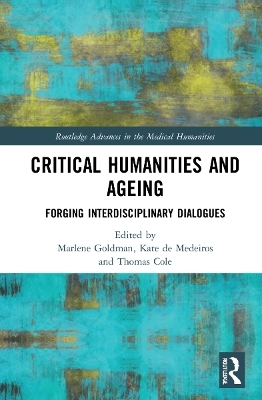
Critical Humanities and Ageing
Routledge (Verlag)
978-0-367-63093-5 (ISBN)
Providing a critical humanities approach to ageing, this book addresses new directions in age studies: the meaning and workings of "ageism" in the twenty-first century, the vexed relationship between age and disability studies, the meanings and experiences of "queer" aging; the fascinating, yet often elided work of age activists; and, finally, the challenges posed by AI and, more generally, transhumanism in the context of caring for an ageing population.
Divided into four parts: Part I: What Does It Mean to Grow Old? Part II: Aging: Old Age and Disability Part III: Aging, Old Age, and Activism Part IV: Old Age and Humanistic Approaches to Care the volume provides an innovative, two-part structure that facilitates rather than merely encourages interdisciplinary collaboration across the humanities and social sciences. Each essay is thus followed by two short critical responses from disciplinary viewpoints that diverge from that of the essay’s author.
Drawing on work from across the humanities - philosophy, fine arts, religion, and literature, this book will be a useful supplemental text for courses on age studies, sociology and gerontology at both undergraduate and graduate levels.
Marlene Goldman is a Professor in the Department of English at the University of Toronto who specializes in Canadian literature, age studies, and medical humanities. In addition to her scholarly works, she has also written, directed, and produced a short film about dementia entitled "Piano Lessons" based on Alice Munro’s short story "In Sight of the Lake" from her collection Dear Life (2004). Her film Torching the Dusties, about ageing and intergenerational warfare from Margaret Atwood’s recent collection Stone Mattress (2014), premiered at the Fright Festival in London, U.K. Kate de Medeiros is the O’Toole Family Professor of Gerontology in the Department of Sociology and Gerontology and a Scripps Research Fellow at Miami University, Oxford, Ohio. Dr. de Medeiros’s research is broadly focused on understanding the experience of later life using narratives and other qualitative and mix-methods approaches. Research topics include storying later life, the meaning of home, suffering in old age, generativity, moral development in later life, and friendships and social connectivity among people living with dementia. Thomas R. Cole is the McGovern Chair and Director of the McGovern Center for Humanities and Ethics at University of Texas Health Science Center in Houston. His work has been featured in The New York Times, NPR, and PBS. Cole has served as an advisor to the President’s Council on Bioethics and the United Nations NGO Committee on Ageing. His book The Journey of Life: A Cultural History of Aging in America was nominated for a Pulitzer Prize.
Part I What Does It Mean to Grow Old? 1.Abolition, Women's Rights, and the Contested Value of Being Old in the Nineteenth-Century United States. Response 1 – Abstracting Ageist Perceptions, Societal Ills, and Racist Burdens on the Psychological Well-being of Black Women: Is "Successful" Aging Still an Option? 2.There is No Such Thing as "the Elderly": Reading Age in Nineteenth-Century American Literature. Response 2 – Intersectionality and Age. 3.Cognition and Recognition in the Ethics of Dementia Care. Response 3 – Philosophical Approaches to Dementia: Some Further Reflections on Agency and Identity. 4.Agency and the Aging Artist. Response 4 – The Art of Bending the Successful Aging Paradigm: Contemporary Older Artists and their Continuing Creative Practices. Part II: Aging: Old Age and Disability. 5.What the Theatre Taught Me about Alzheimer’s. Response 5 – Fuchs’ Case for Stranger Visions. 6.Ableism and Ageism: Insights from Disability Studies for Aging Studies. Response 6 – Fears Generating Ageism and Ableism Are Well-Founded in a Society that Does Not Seek or Support Full Inclusion of All Persons. 7.In Conversation with Sally Chivers: Reimagining Long-Term Residential Care. Response 7 – Aging and Caring amid Words, Stories, and Texts. 8.Queer Aging and the Significance of (Narrative) Representation. Response 8 – What We Miss. Part III: Aging, Old Age, and Activism. 9.Conceptualizing Ageism: From Prejudice and Discrimination to Fourth Ageism. 10.Aging in the Anthropocene: Generational Time, Declining Longevity, Posthuman Aging. Response 10 – Aging in the Anthropocene: Geological Time, Generational Place. 11.Critical Conversations on Aging Futures: Decolonial Perspectives. Response 11 - The Age of (Relentless) Responsibility. Part IV: Old Age and Humanistic Approaches to Care. 12.Intimacy and Distance: Reflections on Eldercare in the United States. Response 12 – Towards a Deeper Understanding of Care in Later Life. 13.Care Work and the Politics of Interdependence. Response 13 – Developing New Forms of Care: From Individual to Collective Agency. 14.Posthuman Care and Posthumous Life in Marjorie Prime. Response 14 – Only Persons Can Provide Person-Centered Care for People Living with Dementia: "Walter Prime" and His Ilk Miss the Mark. 15.Risky Business: Bringing Transformative Creativity to U.S. Nursing Homes. Response 15 – Valuing Risk in Residential Long-term Care: Setting an Important Ethical Standard for Supporting and Nurturing Human Flourishing.
| Erscheinungsdatum | 03.05.2022 |
|---|---|
| Reihe/Serie | Routledge Advances in the Medical Humanities |
| Zusatzinfo | 2 Halftones, black and white; 2 Illustrations, black and white |
| Verlagsort | London |
| Sprache | englisch |
| Maße | 156 x 234 mm |
| Gewicht | 453 g |
| Themenwelt | Sachbuch/Ratgeber ► Gesundheit / Leben / Psychologie |
| Geisteswissenschaften ► Philosophie ► Ethik | |
| Studium ► Querschnittsbereiche ► Prävention / Gesundheitsförderung | |
| Sozialwissenschaften ► Pädagogik ► Sozialpädagogik | |
| Sozialwissenschaften ► Soziologie | |
| ISBN-10 | 0-367-63093-1 / 0367630931 |
| ISBN-13 | 978-0-367-63093-5 / 9780367630935 |
| Zustand | Neuware |
| Informationen gemäß Produktsicherheitsverordnung (GPSR) | |
| Haben Sie eine Frage zum Produkt? |
aus dem Bereich


